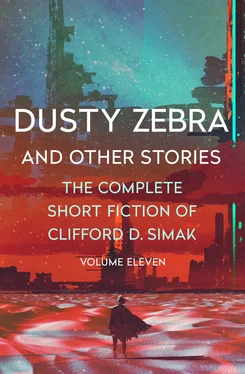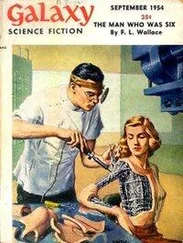What scared the Trader off? I’d give a lot to know. Meanwhile, there are some commercial prospects.
The rose-tinted glasses, for instance, that we call the Happiness Lenses. Put them on and you’re happy as a clam. Almost every person on the face of the Earth would like a pair of them, so they could forget their troubles for a while. They would probably play hob with the liquor business.
The trouble is that we don’t know how to make them and, now that the Trader’s gone, we can’t swap for them.
But there’s one thing that keeps worrying me. I know I shouldn’t let it bother me, but I can’t keep it out of mind.
Just what did the Trader do with those couple of million zebras we sent him?
“Hobbies” is the sixth of the tales that, originally published as short stories in magazines, would later be woven into one of the most iconic books in the science fiction field: City . Written in early 1946 and published in the November 1946 issue of Astounding Science Fiction , “Hobbies,” like the “City” stories that appeared before it, strongly reflects the world war that horrified, and disillusioned, so many.
By the time this story begins, the Dogs, who have been given powers of speech and the guidance of robot aides, have largely been abandoned by the humans they so loved—until another Webster shows up.
—dww
The rabbit ducked around a bush and the little black dog zipped after him, then dug in his heels and skidded. In the pathway stood a wolf, the rabbit’s twitching, bloody body hanging from his jaws.
Ebenezer stood very still and panted, red rag of a tongue lolling out, a little faint and sick at the sight before him.
It had been such a nice rabbit!
Feet pattered on the trail behind him and Shadow whizzed around the bush, slid to a stop alongside Ebenezer.
The wolf flicked his glare from the dog to the pint-size robot, then back to the dog again. The yellow light of wildness slowly faded from his eyes.
“You shouldn’t have done that, Wolf,” said Ebenezer, softly. “The rabbit knew I wouldn’t hurt him and it was all in fun. But he ran straight into you and you snapped him up.”
“There’s no use talking to him,” Shadow hissed out of the corner of his mouth. “He doesn’t know a word you’re saying. Next thing you know, he’ll be gulping you.”
“Not with you around, he won’t,” said Ebenezer. “And, anyhow, he knows me. He remembers last winter. He was one of the pack we fed.”
The wolf paced forward slowly, step by cautious step, until less than two feet separated him from the little dog. Then, very slowly, very carefully, he laid the rabbit on the ground, nudged it forward with his nose.
Shadow made a tiny sound that was almost a gasp. “He’s giving it to you!”
“I know,” said Ebenezer calmly. “I told you he remembered. He’s the one that had a frozen ear and Jenkins fixed it up.”
The dog advanced a step, tail wagging, nose outstretched. The wolf stiffened momentarily, then lowered his ugly head and sniffed. For a second the two noses almost rubbed together, then the wolf stepped back.
“Let’s get out of here,” urged Shadow. “You high-tail it down the trail and I’ll bring up the rear. If he tries anything—”
“He won’t try anything,” snapped Ebenezer. “He’s a friend of ours. It’s not his fault about the rabbit. He doesn’t understand. It’s the way he lives. To him a rabbit is just a piece of meat.”
Even, he thought, as it once was for us. As it was for us before the first dog came to sit with a man before a cave-mouth fire—and for a long time after that. Even now a rabbit sometime—
Moving slowly, almost apologetically, the wolf reached forward, gathered up the rabbit in his gaping jaws. His tail moved—not quite a wag, but almost.
“You see!” cried Ebenezer and the wolf was gone. His feet moved and there was a blur of gray fading through the trees—a shadow drifting in the forest.
“He took it back,” fumed Shadow. “Why, the dirty—”
“But he gave it to me,” said Ebenezer, triumphantly. “Only he was so hungry he couldn’t make it stick. He did something a wolf has never done before. For a moment he was more than an animal.”
“Indian giver,” snapped Shadow.
Ebenezer shook his head. “He was ashamed when he took it back. You saw him wag his tail. That was explaining to me—explaining he was hungry and he needed it. Worse than I needed it.”
The dog stared down the green aisles of the fairy forest, smelled the scent of decaying leaves, the heady perfume of hepaticas and bloodroot and spidery windflower, the quick, sharp odor of the new leaf, of the woods in early spring.
“Maybe some day—” he said.
“Yeah, I know,” said Shadow. “Maybe some day the wolves will be civilized, too. And the rabbits and squirrels and all the other wild things. The way you dogs go mooning around—”
“It isn’t mooning,” Ebenezer told him. “Dreaming, maybe. Men used to dream. They used to sit around and think up things. That’s how we happened. A man named Webster thought us up. He messed around with us. He fixed up our throats so we could talk. He rigged up contact lenses so that we could read. He—”
“A lot of good it did men for all their dreaming,” said Shadow, peevishly.
And that, thought Ebenezer, was the solemn truth. Not many men left now. Just the mutants squatting in their towers and doing God knows what and the little colony of real men still living in Geneva. The others, long ago, had gone to Jupiter. Had gone to Jupiter and changed themselves into things that were not human.
Slowly, tail drooping, Ebenezer swung around, clumped slowly up the path.
Too bad about the rabbit, he thought. It had been such a nice rabbit. It had run so well. And it really wasn’t scared. He had chased it lots of times and it knew he wouldn’t catch it.
But even at that, Ebenezer couldn’t bring himself to blame the wolf. To a wolf a rabbit wasn’t just something that was fun to chase. For the wolf had no herds for meat and milk, no fields of grain for meal to make dog biscuits.
“What I ought to do,” grumbled the remorseless Shadow, treading at his heels, “is tell Jenkins that you ran out. You know that you should be listening.”
Ebenezer did not answer, kept on trudging up the trail. For what Shadow said was true. Instead of rabbit-chasing, he should have been sitting up at Webster House listening—listening for the things that came to one—sounds and scents and awareness of something that was near. Like listening on one side of a wall to the things that were happening on the other, only they were faint and sometimes far away and hard to catch. Even harder, most times, to understand.
It’s the animal in me, thought Ebenezer. The old flea-scratching, bone-chewing, gopher-digging dog that will not let me be—that sends me sneaking out to chase a rabbit when I should be listening, out prowling the forest when I should be reading the old books from the shelves that line the study wall.
Too fast, he told himself. We came up too fast. Had to come up too fast.
It took Man thousands of years to turn his grunts into the rudiments of speech. Thousands of years to discover fire and thousands more of years to invent the bow and arrow—thousands of years to learn to till the soil and harvest food, thousands of years to forsake the cave for a house he built himself.
But in a little more than a thousand years from the day we learned to talk we were on our own—our own, that is, except for Jenkins.
The forest thinned out into gnarled, scattered oaks that straggled up the hill, like hobbling old men who had wandered off the path.
Читать дальше












